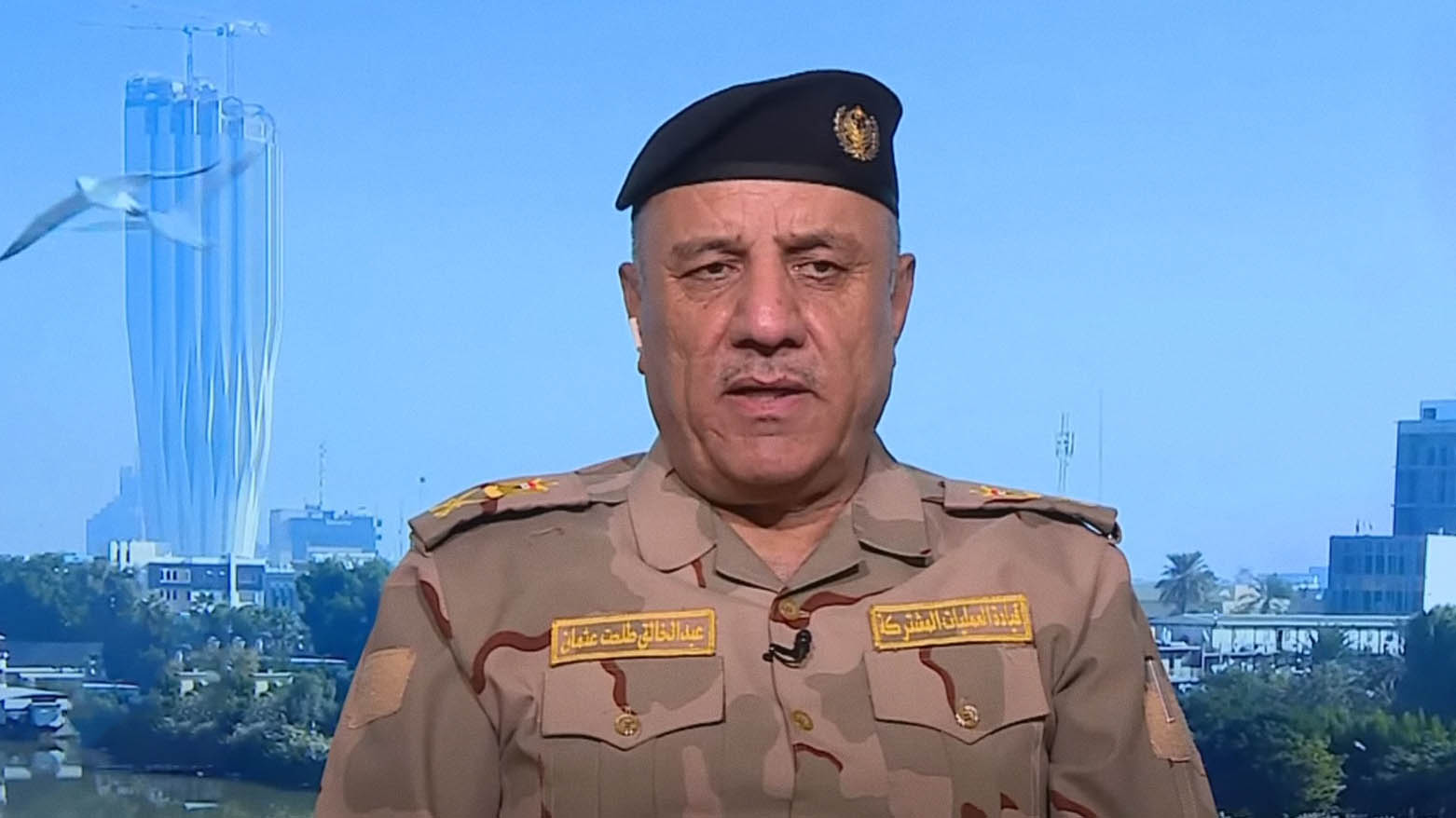'ISIS Still a Danger Despite Abu Khadija’s Elimination,' KRG Representative
Despite continuous counterterrorism efforts, the group's ability to exploit security gaps remains a pressing concern.

ERBIL (Kurdistan24) – Despite the territorial defeat of ISIS in Iraq, the terrorist organization continues to pose a serious threat to national and regional security. Maj. Gen. Abdul Khaliq Talaat, the Kurdistan Regional Government’s (KRG) representative to the Joint Forces Command, has warned that ISIS remains active and capable of launching attacks.
"ISIS will not end, and its activities will continue," Talaat asserted in an exclusive statement to Kurdistan24 on Saturday, March 15, 2025.
Maj. Gen. Talaat underscored the critical role played by the Peshmerga forces in countering ISIS since 2014.
"The Peshmerga has played an effective role in hindering ISIS activities, but their operations persist in areas such as Diyala, Kirkuk, Salahuddin, Nineveh, and the deserts of Anbar. Additionally, they continue to operate in the challenging terrains of Qarachogh Mountain and Hamrin Mountain," he explained.
Despite continuous counterterrorism efforts, the group's ability to exploit security gaps remains a pressing concern.
The high-ranking KRG representative emphasized that the Peshmerga forces deserve recognition for their role in neutralizing high-profile ISIS figures. "
The role of the Peshmerga should have been acknowledged in the killing of Abu Khadija, the deputy ISIS caliph and governor of Iraq and Syria," he stated, lamenting the lack of international and national credit given to Kurdish forces for their contributions to security operations.
Talaat further elaborated on the persistent threat, attributing the ongoing activities of ISIS to security vacuums in Iraq. "The reason for the continuation of ISIS activities is the inability to control areas with security vacuums. ISIS can only be weakened through intelligence operations," he said.
These ungoverned areas provide the group with safe havens to regroup and launch attacks, making it imperative to strengthen surveillance and intelligence-sharing mechanisms.
Joint Operations and the Killing of ISIS Leader Abdullah Maki
The head of Iraq's Counter-Terrorism Service, Karim Aboud al-Tamimi, confirmed ongoing coordination with the Kurdistan Region's security forces, highlighting joint operations that led to the elimination of Abdullah Maki, the ISIS wali (governor) of Iraq and Syria.
“We have maintained strong cooperation with the Kurdistan Region’s security forces, and this year alone, we have carried out several joint operations,” Tamimi stated.
On Thursday, in coordination with Iraqi intelligence and security units, U.S. forces launched an airstrike in Iraq’s Anbar Province, targeting Maki and another ISIS operative. The operation, which involved the Kurdistan Region Security Council (KRSC), was a significant blow to ISIS, eliminating one of the most dangerous terrorist figures in the region.
Read More: Kurdistan Region Security Council Confirms Death of ISIS Governor
Iraqi Prime Minister Mohammed Shia al-Sudani announced Maki’s death, calling him “one of the most dangerous terrorists in Iraq and the world.”
However, despite the KRSC’s instrumental role in the operation, the federal government did not officially acknowledge its contribution. The Council expressed disappointment over this omission, warning that such an oversight could strain future security cooperation.
"Unfortunately, the federal Prime Minister’s statement did not recognize the crucial role played by the Kurdistan Region Security Council in this operation. Such oversight could jeopardize future cooperation between regional and federal institutions," the KRSC said in a statement.
International Reactions and U.S. Confirmation
U.S. Central Command (CENTCOM) confirmed Maki’s death following DNA analysis, stating that he was responsible for overseeing ISIS' global terrorist activities, weapons procurement, and financial networks.
"As the Emir of ISIS’ most senior decision-making body, Abu Khadijah maintained responsibility for operations, logistics, and planning conducted by ISIS globally," CENTCOM stated.
U.S. President Donald Trump hailed the killing of Maki, emphasizing the collaboration between U.S., Iraqi, and Kurdish forces. "His miserable life was terminated, along with another member of ISIS, in coordination with the Iraqi Government and the Kurdish Regional Government," he posted on his X account.
Read More: Trump Applauds Killing of ISIS’s Leader in Joint U.S.-Iraq-Kurdistan Operation
The Commander of U.S. Central Command, Gen. Michael Kurilla, also stressed the strategic importance of eliminating high-profile ISIS figures. “Abu Khadijah was one of the most important ISIS members in the entire global ISIS organization. We will continue to kill terrorists and dismantle their organizations that threaten our homeland and U.S., allied and partner personnel in the region and beyond.”
Security Cooperation and Future Challenges
Talaat highlighted that "there is coordination between the Peshmerga forces and the Iraqi army to weaken ISIS, especially coordination between the Kurdistan Counter-Terrorism and Iraqi Counter-Terrorism units, which has led to the weakening of ISIS activities in many areas." This level of cooperation has led to more effective counter-terrorism operations and has significantly restricted the movement and operational capabilities of ISIS militants in key conflict zones.
In discussing current security measures, Talaat acknowledged the establishment of two joint brigades as a significant step in countering ISIS. "The establishment of two joint brigades, which are now stationed in their positions, has had a strong impact on hindering ISIS. There has been no ISIS movement in their area of operation," he noted.
However, he stressed that these efforts alone are insufficient. "The security vacuums between the Peshmerga forces and the Iraqi army, which extend 560 kilometers, cannot be controlled by just two brigades. We want to increase the number of brigades to fill these security vacuums," he asserted.
Despite these coordinated efforts, Talaat’s warning serves as a stark reminder that the ISIS threat has not been fully eradicated. The ability of the terrorist organization to exploit security vacuums and launch sporadic attacks underscores the need for sustained military operations, enhanced intelligence efforts, and stronger coordination between security forces.
The Kurdistan Region remains vigilant and committed to combating ISIS and ensuring stability in Iraq and beyond.